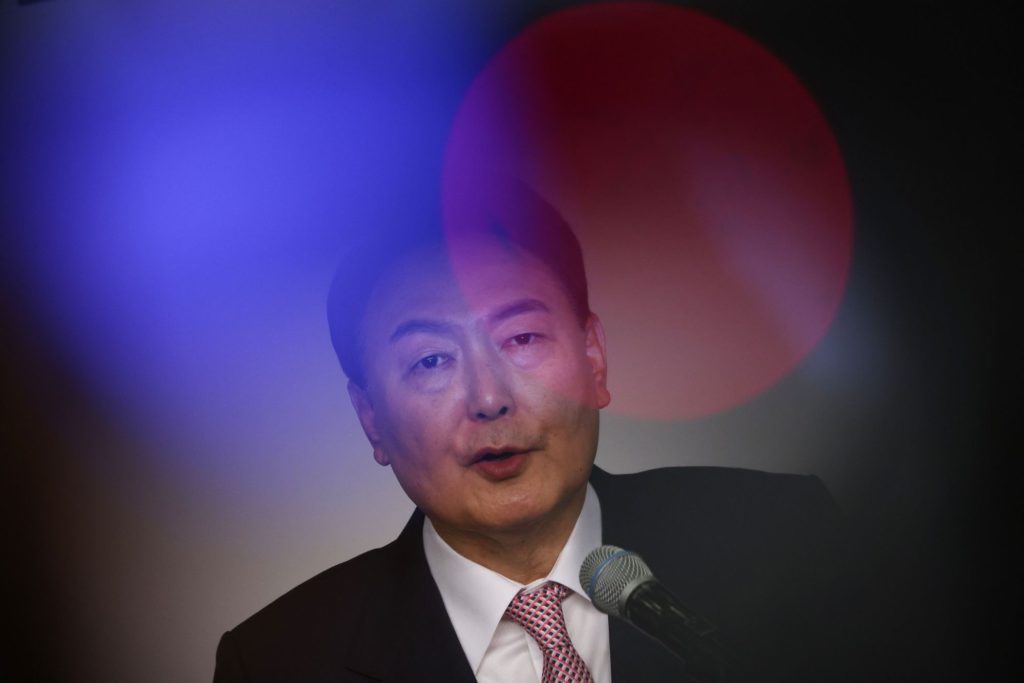(Bloomberg) — South Korea’s Yoon Suk Yeol, a former prosecutor who made his name taking down a president, must now show he can govern as one.
Yoon took office Tuesday as South Korea’s eighth elected president since full democracy in 1987, facing daunting challenges from a Covid-ravaged economy to increasing weapons tests by North Korean leader Kim Jong Un.
The conservative must overcome a hostile legislature, a lack of diplomatic experience and historically low popularity for an incoming elected leader in Asia’s fourth-largest economy.
“I solemnly pledge today that I will do my utmost to elevate Korea into a country that truly belongs to the people, a country based on the pillars of freedom, human rights, fairness and solidarity,” Yoon said in his inauguration speech delivered from the front steps of the National Assembly on a sunny Tuesday to a crowd of several thousand people.
His comments echoed pledges he made during the campaign to decrease the role of government in markets and bolster private sector-driven economic growth.
Yoon, who in March squeaked out a victory in the closest presidential race in the country’s history, has called for greater private-sector-led growth, bolstering the nuclear power industry and a tougher approach toward China and North Korea.
“The Yoon administration must revise and change pretty much all of the South Korean government’s strategic policies, including foreign policy and the policy for North Korea,” said Cheon Seong-whun, a former security strategy secretary for South Korea’s presidential office.
Conservative Election Win in South Korea Shows Hawkish Turn
While market players have been encouraged about the prospects of Yoon abolishing a capital gains tax planned for next year, surveys show the majority of the public are not sold on him as he embarks on the single, five-year term for presidents.
Yoon takes office with an approval rating of 41%, according to Gallup Korea, making him the first new elected leader not to hit 50% before taking over. The support rate is also below that of Moon, who leaves with a mark of 45%, it said.
Yoon will quickly be tested with President Joe Biden set to visit Seoul for talks about 10 days after he takes office.
The U.S. leader may like what he hears from Yoon, who vowed the major semiconductor-producing country would take part in the Biden administration’s new supply chain initiative, strengthen military cooperation and back the Quad grouping of Australia, India, Japan and the U.S.
that is seen as a counter to China’s assertiveness in the region.
“The incoming South Korean administration’s willingness to collaborate more with the United States as well as the Quad could have an impact on non-traditional security issues such as supply chain resilience,” said Naoko Aoki, a nonresident senior fellow at the Atlantic Council.
Aoki added coordination that involves the broader international community may be a challenge due to Russia’s invasion of Ukraine and U.S.-China competition.
“It could also be difficult to steer the attention of the United States away from the Ukraine crisis, too, despite North Korea’s frequent missile tests,” she said.
Moon’s feud with Japan over contrition for its 1910-1945 colonial rule on the Korean Peninsula and efforts to court China frustrated U.S.
efforts to stitch together a stronger coalition in Asia. In a bid to begin to defrost the relationship, Hayashi and Yoon’s pick for foreign minister, Park Jin met over dinner on Monday and agreed that strategic ties between their countries have never been so important, Japan’s Foreign Ministry said in a statement.
But gridlock awaits Yoon, with Moon’s Democratic Party holding a supermajority in parliament until at least the next elections in 2024.
Yoon squandered political capital before taking office with an unpopular decision to immediately move the presidential office from the long-used office and residence known as the Blue House.
His government will take it to a part of Seoul where the Defense Ministry is located that also hosted a U.S. military base for decades.
South Korea President Yoon’s Blue House Move Will Reshape Seoul
North Korea’s official media has only mentioned Yoon once, delivering a one-sentence dispatch when Yoon won the March election.
But Pyongyang has let him know that a rough ride awaits, after Moon for five years sought rapprochement and often avoided punishing North Korea for its bad behavior.
Since Yoon’s election, North Korea has been on a pace for its busiest year of missile tests, firing off in March its first intercontinental ballistic missile since 2017 and launching new missiles designed to strike South Korea with an atomic weapon.
Meanwhile satellite imagery indicates North Korea is preparing for its first nuclear test in nearly five years.
Yoon extended an olive branch to North Korea, saying his government was ready to offer it an “auspicious package” of aid if it truly embarked on ending its atomic arsenal.
“North Korea’s denuclearization will greatly contribute to bringing lasting peace and prosperity on the Korean Peninsula and beyond,” Yoon said.
(Updates throughout with Yoon’s inauguration speech)
More stories like this are available on bloomberg.com
©2022 Bloomberg L.P.











